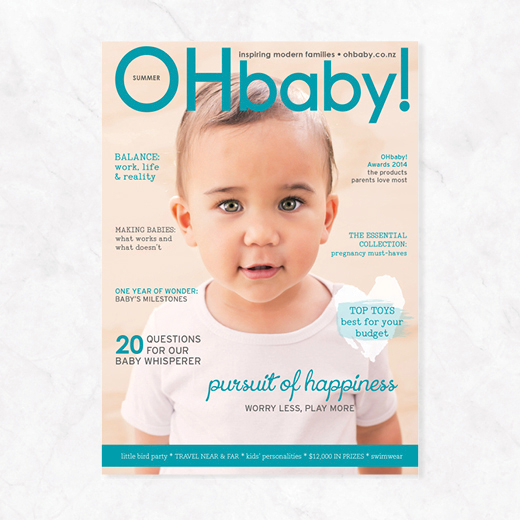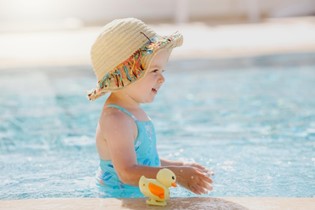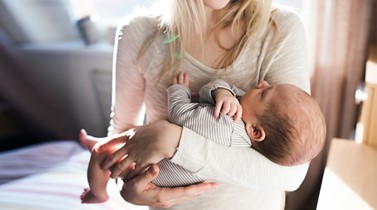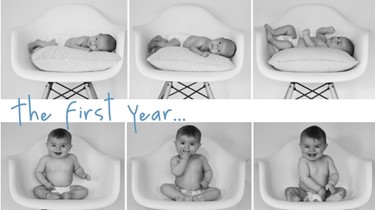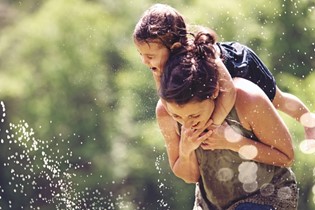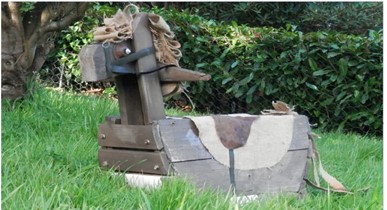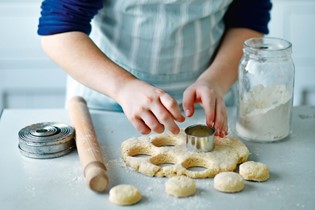The power of being a playful parent

Life is busy and we all have stuff to do, so sadly fun has fallen off many a parent’s agenda. Miriam McCaleb puts the case for prioritising play.
Once upon a time I was fun. As a young trainee teacher, I’d roam kindergarten with kids trailing like I was the Pied Piper of Playful. Throughout my twenties, I’d gravitate to where the children were at parties. I’d squash into cupboards with my nephews and play dress-ups with friends’ kids.
Inconveniently, all that was before I became a mum. These days when I could use a playful spirit, I’m often leaning more towards grumpy. It feels like the fun version of myself spends vast chunks of time missing in action.
Life piles on responsibility and interruption and strips away rest and downtime. Our children are masters of wondering, watchfulness and play, but caring for them can be so labour intensive that we end up feeling too wrung out to appreciate the discoveries our kids so long to share with us. Appreciate the present moment? But I’m writing a shopping list in my head right now. Marvel at the raindrops on the windows? “Can’t, babe. The washing needs folding.”
Any pressure can impact interactions with our children. For example, my two-year-old is going through a full-on performance phase and loves nothing more than a stage. When we were on holiday in my husband’s hometown, I felt rich in time and patience. We were at the library and there were these amazing acoustics at the top of the stairwell. Toddler started singing loudly and soulfully. I laughed and smiled. When I perhaps should have shushed her noise levels, I made a wee movie of her, all smug, like “her creative expression is so much more important than rules, man.”
Fast-forward a couple of months and we’re back on our home turf. We’re negotiating curtain fabric for our eldest daughter’s room. The shop is quite posh, with bolts of imported cloth and super stylish locals. It is in a renovated church hall so there is a stage. And of course youngest daughter cannot resist. Up she goes, voice raised. Her arms sweep wide and she’s throwing her head back. This time I’m not making movies and admiring her creativity, I’m trying to get her to hush. I’m quite embarrassed, and cross. Now I’m a pauper in time and patience. I hustle her into the car prematurely, the poor kid wondering, “What’s up?”
Feeling robbed
Friends, beware those notorious kidnappers: Busy and Tired. They rob us of lightness, and play. They interfere with our family relationships. And they prematurely age us. George Bernard Shaw said “We don’t stop playing because we grow old; we grow old because we stop playing.” Play is so valuable – for our kids, our relationships and us. It is worth fighting for. Those bullies Busy and Tired will bloom and grow like weeds, suffocating your pretty flowers. I want to invite you to flip your thinking around. Let’s not allow Busy and Tired to dictate how playful we get to be. What if, instead, we let our level of playfulness determine how much Busy and Tired we let in?
The acts of noticing play, prioritising play and making room for play does life-changing things. To revisit the gardening metaphor, weeds can’t grow as big when there are nicely nurtured play plants blooming in the family garden.
Power play
There is no denying the benefits of play for children. Kids use more sophisticated language during dramatic play. They practice decision-making, conflict resolution and negotiation. Laughter boosts production of the neurochemicals that support cell connection in the brain. Play is where children practice new ideas, problem solve, imagine scenarios. Pretend play is amazing for developing empathy as kids try out other roles.
Play enables children to increase their skills and understanding of the world. It is so important to optimal child development that play has been recognised by the United Nations High Commission for Human Rights as a right of every child. And, oh yeah, it’s fun!
As if those are not compelling enough reasons, research also confirms that a playful connection is effective at strengthening the adult-child relationship. In the words of the American Academy of Pediatrics, “Play ... offers an ideal opportunity for parents to engage fully with their children”.
A playful connection with a child fuels and feeds the relationship in profound ways. During play we practice reading cues (Is this still fun for you?), a skill that will serve as our children grow and our role evolves. Play is an invitation for physical closeness, snuggling and touching, and touch is vital for supporting healthy brain growth. When we play we share laughter, boosting those feel-good opioids in both parents’ and baby’s brains.
As long as we curb our desire to control, instead allowing kids to lead the dance, play is one of the best tools we have for maintaining closeness throughout childhood into adolescence. And beyond.
Player of the day
Why, then, was my daughter’s loud library song okay on holiday, when singing in our own neighbourhood was not?
Family life is busy. Our tamariki might have a slew of activities to fit into their week, leaving less time for creative, free play. Feeling busy can be a huge barrier preventing adults from feeling playful. An impending deadline can take up masses of headspace, and it’s hard to be fun and creative when there’s just so many tasks to achieve in a single day: “C’mon, have you got your sunhat?”; “C’mon, it’s time for your bath”; “PJs on then off to bed.”
Mindfulness can help. Start by noticing what you think of play. How would you describe the role of play in your typical day? Is it a cherry on the top, like a bonus that may or not happen, depending upon your week? Is life pure play, nothing but cherries? A whole bowlful? (Fresh, please, not those weird glâcé ones). Or is yours a sundae with no cherry at all?
With this in mind, practice noticing what is going on moment by moment, without judgement. Any random second, try hitting your internal pause button and just observe. Even during tense, tired times; in fact especially then. During the evening routine when everyone is exhausted, just take time to notice.
Next, experiment with filling that space with play. A small, playful overture (a silly voice, an unexpected dance move, instructions delivered in song) can be transformative. It can render our kids more cooperative and make the whole exchange less fraught. Yes, sometimes we don’t feel like doing that so perhaps parental moodiness ought to be acknowledged as a barrier to play.
Food, water or a walk around the block can sometimes counter this. Again, just notice how often your behaviour may be working as a barrier to nurturing playful relationships. Dig deep, suck it up, and use the crazy accent. Sometimes you gotta fake it till you make it.
Simon says
At our local school we are lucky to have one of the most playful adults I’ve ever met as the principal. Simon Green advocates “short, frequent bursts of parent-initiated spontaneity and chaos”. For instance, he recommends: “an unexpected lightsabre battle; call the home phone from your mobile while you are in another room, and watch the reaction; disappear down the invisible stairs behind the kitchen bench. The unexpected is what thrills children.”
Even when we are feeling time-poor we can find ways to hurl mini play-bombs into our daily lives. Try attaching a playful manouevre to a daily activity. I know a dad who reportedly wiggles his bum for the family whenever he gets the tomato sauce out of the fridge. This delights his kids, and it takes no extra time.
Another barrier can be when adults undervalue play. Some folks can have the misconception that play gets in the way of serious goals. To the uninitiated, play can seem like time wasting. Again, Simon Green says, “Play doesn’t need a beginning and an end. The outcome is not the measure of success. Play is a disorganised, organic thing.”
So practice saying “Yes”. Sarah Best captures this idea beautifully in this excerpt from her forthcoming book Changing the World is Child’s Play. She describes a mother driving past the beach on the way home from school when one of the kids asks to stop:
“Hmmm, that wasn’t really her plan. There was dinner to cook, there were jobs to do... But she chose to say ‘Yes’. Pulling over, they hopped out of the car and opened the boot to retrieve the togs and towels that lived there constantly. Off they went to really experience this first glorious day of spring. Sand, shells, salty air, gentle sun, calm breeze and freezing water – yet in they all went. This time together was not forgotten. Unlike all those other days of simply coming straight home and getting on with jobs.”
And we all know she is right. I doubt anyone has ever lain on their deathbed and implored “If only I’d spent more time doing housework!”
Playful thinking
• Be peaceful about temporary mess. We can have tidy houses when we are retirees. One of my favourite mottos, especially when my super tidy husband is rolling his eyes, is “A family lives here”.
• Playing together doesn’t have to mean together. Try parallel play, that is playing alongside one another. Maria McKenzie, a colleague from the Brainwave Trust Aotearoa, shared how freeing it was to embrace playing alongside her kids, accepting their different styles. Daughter built houses, son smashed towers and she sorted pieces according to colour.
• Reminisce about your own memories of play. What did you love to do? Share these stories with your kids.
• Think about home design. Don’t expect children to want to only play in designated playrooms. Who can blame them for wanting to be where you are? For a few years, embrace having toy storage in every room.
• If household routines are very stressful (i.e. the morning rush) and the thought of injecting play into them is miles away, start by thinking how to make the routine flow more fluidly so there is space to be a bit crazy for a moment or two.
• We don’t always have to be there. Child-only experiences can be golden.
Try this at home
• Break the ice at a play-date by getting down on the floor and connecting with the children. Play with the blocks and cars, and chat as much to the kids as you do to the adults. Children will settle into play more smoothly and you might then get a few minutes of uninterrupted conversation!
• Support your friends in being as playful as they can in their parenting. Ask for support in the same. Keep reminding each other about the value of play. Praise messy houses and wonky art projects.
• Watch your language. If you find yourself describing play as noisy, messy, lame or inconvenient (even inside your head!) instead try practicing, learning, growing and creative.
• Enjoy the physicality of play. Find ways to stretch, sweat, and move when you are with your children. Love dancing, basketball, or kapahaka? See if you can weave those activities into play.
• Stay fit and limber so you can keep up with the children. Especially important for us – ahem – older parents. A strong core will protect your back. You’re welcome.
• Finally, you have to take care of you. If you are not feeling nurtured, it will be increasingly difficult to provide nurture. If you have got nothing left in your tank for play, let that be a cue to make some changes. What would feed you? A babysitting swap with a friend so you can get to a spin class once a week or a delightfully fluffy novel to read at bedtime – make sure there is something just for you.
Writing this has inspired Miriam McCaleb to keep practicing saying “Yes!” to her kids. She’s a former kindergarten teacher and university lecturer who dedicates this article to Playcentres everywhere: a uniquely New Zealand movement dedicated to families and play. Read more from Miriam at baby.geek.nz.

AS FEATURED IN ISSUE 28 OF OHbaby! MAGAZINE. CHECK OUT OTHER ARTICLES IN THIS ISSUE BELOW
